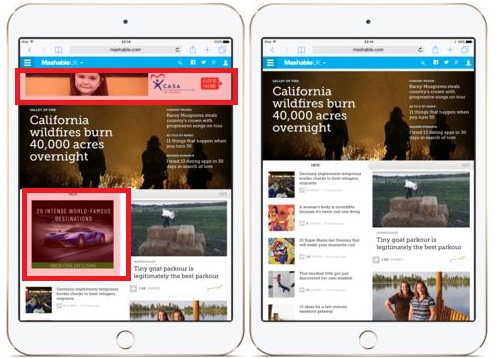The developers of popular ad blockers are letting some ads through to consumers… for a fee, according to a news report.

The Wall Street Journal reports that Crystal, a popular iOS app that block ads on Web pages viewed in the native mobile Safari browser, will soon accept payments from advertisers to let their ads slip through and appear on users’ screens.
Meanwhile, Eyeo, the firm he company behind popular ad blocking software AdBlock Plus will set up an independent board to oversee its ‘whitelist’ of acceptable ads.
Eyeo, says those advertisers who want to get on its so-called “whitelist” must abide by rules against annoying or intrusive ads, but until now has made the final decision on which ads should be allowed.
About 70 companies are reportedly signed up, but their names have not been disclosed.
According to The Journal, those companies pay Eyeo, and Eyeo in turn pays Murphy to include its so-called “white list” in Crystal.
Ads from companies on that white list will appear on iPhone and iPad screens, even when the software is turned on. Eyeo also plans to make similar deals with other developers.
The company says ads that evade Adblock Plus must comply with its “acceptable ads” policy, which stipulates that ads can’t be too disruptive or intrusive.
A number of companies created apps that defeat ad blockers, with Google’s Chrome bypassing ad blockers to serve ads streamed on YouTube.
In addition, Hulu, for example, will not let visitors view its content if they use ad blockers. Hulu offers an ad-free version of its service, but it costs extra $12 a month.
Adblock Plus co-founder Till Faida said: “Users determined the original criteria and can object in our forum to whitelisting proposals, but since we were the only ad blocker to offer such a compromise we have taken on a large role in the day-to-day maintenance of the criteria,. We have been looking for a way to make the Acceptable Ads programme completely independent while also updating the criteria to evolve with changing forms of online advertising. An independent board solves both issues.”
Though the move could give the whitelisting a degree of independence, publishers and advertisers are likely to remain hostile to Eyeo’s approach. On Tuesday, Scott Cunningham, senior vice_president at the Internet Advertising Bureau, called ad blocking “highway robbery” and urged ad blockers to “play fair”.
Read the full WSJ report here
